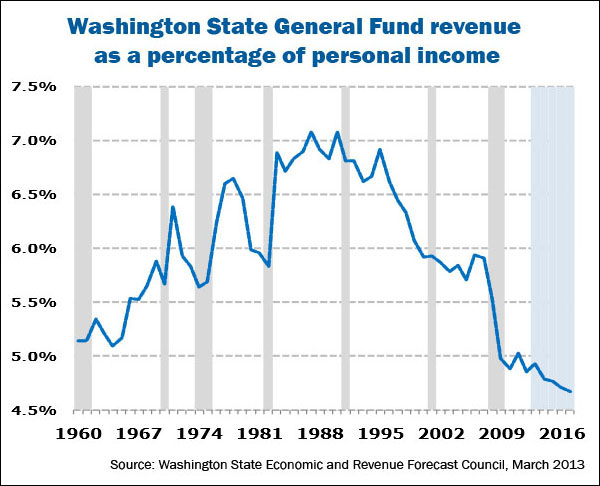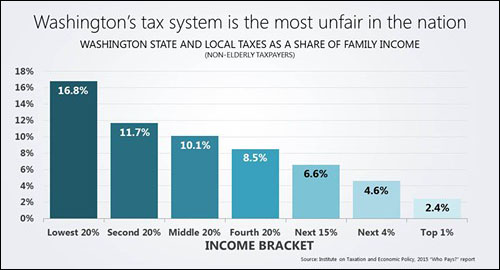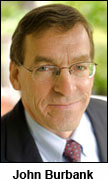OPINION
Letting wealthy to avoid paying their fair share grinds us down
By JOHN BURBANK
(June 18, 2015) — It’s a good time to talk about money, who has it and who doesn’t, especially with the Legislature at loggerheads about the budget. Why? Because the taxes that fund our state’s budget come largely from the money we all spend.
Notice I wrote “money we all spend,” not “money we all make”? In most other states, taxes come from money people make, whether by working for a paycheck or watching the stock market go up, but not here. Half of our state’s revenue comes from sales taxes. So in Washington, when we spend less on taxable goods, state revenue for things like higher education and K-12 education takes a dive.
 The years 2001 to 2011 were an excellent demonstration of this. Our state’s general fund revenues fell from more than $6,000 per capita to $4,000. How did we make up the difference? By shorting our kids — and by extension, our collective future. We now are 46th among the 50 states for K-12 investment as a percent of personal income. We increased tuition at the UW from $5,000 to more than $12,000. We starved public parks, closing some and running the rest on a shoestring.
The years 2001 to 2011 were an excellent demonstration of this. Our state’s general fund revenues fell from more than $6,000 per capita to $4,000. How did we make up the difference? By shorting our kids — and by extension, our collective future. We now are 46th among the 50 states for K-12 investment as a percent of personal income. We increased tuition at the UW from $5,000 to more than $12,000. We starved public parks, closing some and running the rest on a shoestring.
This is no way to keep up with the demands of a 21st century economy that depends on things produced by the government, like transit, roads, parks, and, yes, an educated citizenry.
Taxable retail sales — that is, the tax you pay when you buy pants at Fred Meyer — have plummeted in the past two decades, as a percent of total state income. Such sales used to equal more than 50 percent of total GDP in our state; now they make up about one-third. Consumer spending by people between the ages of 35 and 55, who should be at the height of earnings and family expenditures, actually dropped between 1989 and now by $7,500 (adjusting for inflation).
We can’t run public services on a stream of revenue that is turning into a trickle. So where can we find the taxes for public services? We simply need to follow the money. Seattle, Bellevue and the rest of the Eastside have one of the biggest concentrations of six-figure households in the country. When we consider seven and eight figure incomes, we are near the top… of the world.
But we in Washington don’t tap into any of that income, and not by accident or act of nature.
The celebration and enhancement of the wealthy while public services for the vast majority of citizens are starved is the result of quite clear public policy. One result of these decisions is the pulling apart of the middle class, with the majority of families falling down the income ladder, and a small minority rising up. And with the shrinking of public services, we have effectively pulled the rungs out from under the people falling down the income ladder to climb back up.
Just-released IRS data shows that for the top 1,000 households in the U.S., income doubled from about $80 million in 2003 to over $160 million in 2012 (these figures are inflation-adjusted). Families between 97% and 98% of the income pile saw their income go up $23,000 to $253,000. Families between 80% and 90% got a $647 gain. But for all taxpayers below the 80% threshold – making up four out of every five families, income fell. For families in the bottom 50%, their average income fell almost 20%, by more than $3,000.
 In our state, the 30,000 families at the top of the income heap contribute very little of their income — 2.4% — to help finance the state’s schools, colleges, mental health facilities, the state patrol, or our court system — while the middle class contributes 10% and families under $20,000 contribute 17%, primarily via sales taxes.
In our state, the 30,000 families at the top of the income heap contribute very little of their income — 2.4% — to help finance the state’s schools, colleges, mental health facilities, the state patrol, or our court system — while the middle class contributes 10% and families under $20,000 contribute 17%, primarily via sales taxes.
The choice confronting all of us (because state legislators are very likely to kick the can down the road for another year) is a moral one: do we invest in our state, our children, our infrastructure, and our future — or do we allow this fiscal crisis just to grind us down?
So far, it has been grinding us down. But when we consider that democracy is supposed to present opportunity for all of us, it makes sense to tax some of the wealthiest in our state (and, indeed, the world) to finance a stronger future for everyone.
 John Burbank is the executive director and founder of the Economic Opportunity Institute in Seattle. John can be reached at john@eoionline.org.
John Burbank is the executive director and founder of the Economic Opportunity Institute in Seattle. John can be reached at john@eoionline.org.





